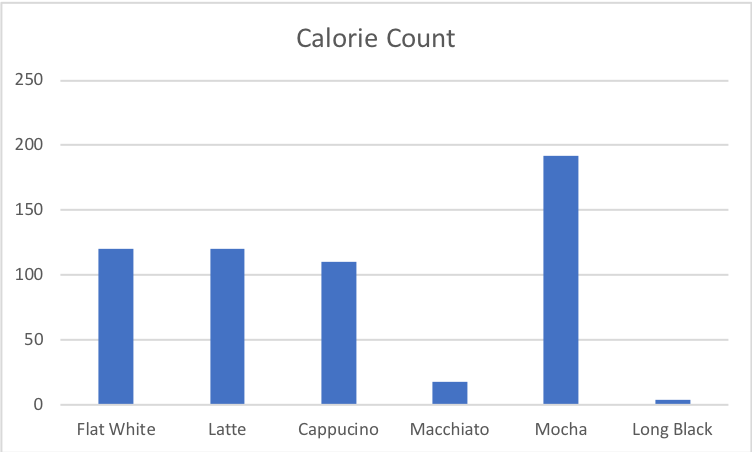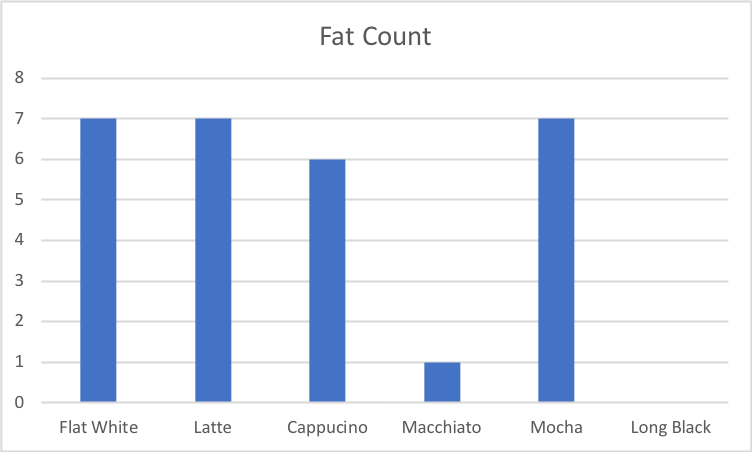Nutritional Aspects of Different Types Of Coffee Drinks
Posted by Mark Bentham, The Coffee Man on 26th Dec 2018
With the exciting advent of a new year, our well planned New Year resolution start time is just around the corner. An always popular resolution choice is to make healthier choices for a better quality life, and we invite you to consider your daily cup (or cups) of coffee in your healthful overhaul for the ‘New Year – New Me’. Different types of coffee drinks will have different nutritional compositions and are well worth taking a close look at.
Being that the morning ritual of enjoying a delicious blend of milk, sugar, and caffeine is regarded as one of the essential and nicer daily routines in life, making choices relating to your coffee consumption based on the different types of coffee drinks you choose can impact your health in a big way.
75% of Aussies enjoy a cup of coffee a day, and 28% have 3 or more cups a day.
That is a lot!!!
Coffee Is Good For You!
Thankfully, coffee not only tastes amazing, but it also has many health benefits that make it a GOOD choice when working on increasing your healthfulness.
- Increase alertness, focus, and mental activity
- Antioxidants which protect your cells against nasty free radicals that are formed from when food is broken down or absorbed from environmental pollutants such as tobacco smoke and radiation
- Polyphenols which protect your body from oxidative stress and can lower the risk of cancers, inflammation and coronary heart disease
- Burn fatty acids through breaking down the fatty acids stored in fat cells via lipolysis
- Stimulate the metabolism during the 3-hour caffeine process period
- Lower the risk of Type 2 diabetes
- Lower risk of Alzheimers, Parkinsons and Liver Cirrhosis, some cancers and can reduce the risk of stroke
Coffee Contains Micronutrients
A micronutrient is a chemical element or substance that is essential to bodily function and is required in trace amounts growth and development of living organisms.
Compared to macronutrients, which are required in large quantities for the normal growth and development (ie: fats, proteins, carbs), micronutrients are just as important, but you need less of them.
Coffee contains some important micronutrients. They are small in quantity, but in some highly processed and Westernised diet (we are looking at You, America), studies have found that there is a higher nutritional content in coffee than in some of the food consumed as part of a highly processed diet.
Nutrients found in coffee include the below, based on a cup of ‘long black’ style coffee of about 100ml.
- Sodium – trace
- Potassium – 92mg
- Magnesium – 8mg
- Manganese – 0.05mg
- Riboflavin – 0.01mg
- Niacin – 0.7mg
- Pantothenic acid is also present in coffee
This is exceptionally good news for coffee lovers!
Everything in Moderation
While improving health, it is important to remember that all things in moderation is a good way to look at it. Some of the factors that make a great coffee can also be things you need to keep an eye on if you are trying to lose weight.
While a standard black coffee contains almost zero calories, the calorie count can skyrocket if you start splashing around loads of milk and sugar. Not to say you should avoid these wonderful coffee additions, but just be mindful of what the big picture is if you are having more than a few coffees in a day and you are watching your weight, or have food intolerances.
Milk and even nut mylks (more on these below) add fat content to your daily cup of coffee. This is not a bad thing as the body needs good fats, but be sure to incorporate the calorie and fat count when thinking about your daily intake.
Sugar. Our dear friend sugar. Sugar is something you need to watch. With every tablespoon of sugar, you add to a coffee, you are adding 48 calories to your coffee drink. That’s the equivalent a whole apple, and apples are high in sugar as far as the fruit world is concerned. And while we need certain types of sugar found in carbohydrates, we do not need the processed sugar you are adding to your coffee.
Overdoing the caffeine can cause anxiety symptoms in some people, like those with pre-existing anxiety disorder. It is important not to overdo the caffeine, but listen to your body (everyone is different) and choose decaf (swiss water only!) or the time you drink your coffee to manage any negatives that may be experienced from too much of the good stuff.
Individual coffee nutrition content
I’ve prepped a breakdown here of the more popular different types of coffee drinks so if great health is on your list for 2019, your morning ritual choice can be an informed one. These stats are based on a 220ml cup of delicious coffee.
Flat White
Usually 2/3 milk and 1/3 coffee this is one of the most standard types of coffees we see in cafes around Australia.
120 calories
7 grams fat
Latte
A latte and a flat white have the same milk content, just the milk is prepared in a different way (steaming a flat white, foaming a latte)
120 calories
7 grams of fat
Psst... check out our latest Coffee Shot explaining the difference between a Flat White and a Latte!
Cappuccino
Slightly less milk than a latte or a flat white make a capp slightly lower in calorie count
110 calories
6 grams of fat
Macchiato
This type of coffee drink is very low in fat as just a dash of milk is added. A great choice if you want to have the coffee satisfaction and like a milk based coffee but are watching your calories.
13-18 calories
Mocha
Adding chocolate either in syrup or powder form to the milk based coffee makes this a pretty special treat type of coffee. A bit heavier on the calorie and fat content through the chocolate, the nutritional value ranges based on the chocolate type. Choose a really high quality, high cocoa level chocolate and melt it into your coffee if you want to get the most of the benefits offered in good chocolate, and avoid the sugary syrups.
The below is based on mixing pure cocoa powder (ie: making a milky hot chocolate) to a latte style coffee.
192 Calories
7 grams fat
Long Black
This is the best choice if you want to minimize weight gain.
4 calories
Zero fat


And keep in mind, the different nutritional benefits of cows milk alternatives… We like to call them ‘Mylks’! They are easily made in home kitchens, commercially, and there is a wide range sold at supermarkets so it is tricky to get an accurate overview unless you consider a selection you have available to you. Speaking broadly, soy mylk is around 27 calories per 50ml, almond mylk about 20 calories and cashew mylk about 25 calories. Compared to 50 ml of cows milk being about 73 calories, some people choose these nut and soy mylks over cows milk as an alternative for weight loss as well as for a myriad of other reasons. Try them next time the opportunity presents itself – while they will make the coffee taste different, coffee does taste great with all the different sorts of mylk, they may make you feel better in the long run if you have a sensitivity to dairy, and of course, no animals are harmed!
- soy 27 cals, 2 grams fat
- almond 20 cals, 2 grams fat
- cashew nut 25 cals, 2 grams fat
So to sum things up, if you are choosing good health as part of your 2019 New Years Resolution, coffee is your friend! Just carefully consider how you will continue to enjoy the worlds favourite beverage because it is totally possible to be wonderfully healthy with all the benefits that coffee bring you, as well as work toward weight management and wellness. Remember to choose organic always (check out our award winning organic blend here) and keep within your caffeine tolerance boundaries.

